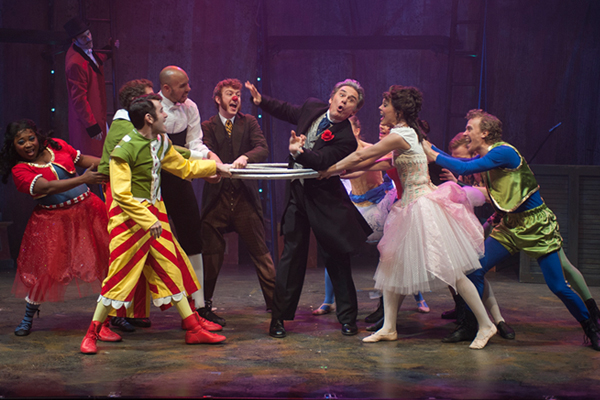
Photograph: Michael brosilow
With its hokey dialogue and forgettable Cy Coleman score, the producer of Barnum—the musicalized story of Phineas Taylor Barnum—relies heavily on spectacle. Any production on this topic requires massive amounts of razzle-dazzle, world-class stunts and astounding feats of flim-flammery. Without them, the tale of P. T. Barnum, that gifted bamboozler whose credo was “there’s a sucker born every minute,” lands with the thud of an out-of-shape aerialist who has toppled from the high wire.
Directed by L. Walter Stearns with musical direction by Eugene Dizon (book by Mark Bramble, lyrics by Michael Stewart), the show limps along with meh mediocrity where it should shine with eye-popping, gee-willickers thrills. While Stearns has snagged some of the best song ‘n dance showfolk this side of the Mississippi, his cast is painfully lacking in the elite-level of circus talent that Barnum demands. There’s a bit of pedestrian juggling, some basic back flips, a duo of awkward rope swingers, and magic tricks fit for a middle school talent show. For all his rhapsodizing about living a life in blazing color, Barnum’s costumes—while indeed rainbow bright—look cheap and hardly evoke the mid-19th century time frame.
Gene Weygandt leads the cast as the eponymous showman. Given Weygandt’s seemingly innate aura of charismatic mischievousness, he should have been ideal for the role. Moreover, as a veteran Wizard from the show Wicked, the man knows his way around the world of a beguiling humbug. But Weygandt is hamstrung here, cobbled by Bramble’s hackneyed dialogue and reduced to performing shruggingly unimpressive illusions.
Equally underwhelming is Cory Goodrich as Barnum’s wife Charity. Goodrich is one of the best sopranos in the business and her stage presence could evoke empathy from a stone. But like Weygandt, she’s caged in a stock character who lacks depth. Kevin McKillip as James A. Bailey is the sole performer who manages to imbue the show with a bit of genuine wonder. McKillip is a gifted actor with a long history of clowning—he’s got an irresistible air of mystery and grandeur.
Finally, the acoustics at the Mercury are less than ideal. Dizon’s six-piece on-stage band sometimes overpowers the vocals, rendering the lyrics less than intelligible. A show about the Greatest Show on Earth deserves better. The production might be acceptable in a more provincial city, but Chicago audiences have long been astounded by the gasp-inducing aerial artistry of Lookingglass Theatre and the magic of House Theatre’s Dennis Watkins. Barnum just isn’t in the same three-ring arena.
Barnum plays at the Mercury Theatre, 3475 N. Southport, through June 19. Tickets start at $25.


